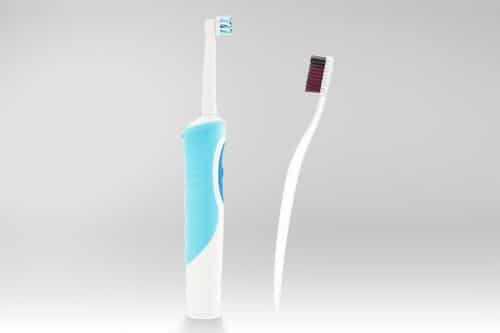It seems that electric toothbrushes are all the craze these days. They’re on every commercial, every billboard, and every website. In most of these cases, 9/10 dentists recommend switching to an electric toothbrush.
But, are electric toothbrushes too really worth it?
Is it better for your teeth to shell out a bit more money for an electric toothbrush?
What’s so bad about manual brushes?
If those are the questions burning deep inside your mind, you’ve come to the right place; Hamptons Dental is ready to deep dive into the difference between manual and electric brushes.
Why are Manual Toothbrushes a Problem?
The staple of the modern bathroom is having a good ol’ toothbrush rack with every family member’s brush lined up. Traditional brushes have been used by you, your parents, and your grandparents (in most cases), but why are they suddenly a problem?
Manual toothbrushes have some pros that can’t be ignored before diving into their issues:
- They are extremely accessible. These brushes are available at most markets, stores, and even gas stations.
- You also do not need batteries to get them to function.
- They are also, at most, a couple dollars. A real bargain.
Even though they are very common and cheap, they have some cons as well.
- Studies have shown that individuals using a manual brush rub too hard against their teeth and gums. This could lead to bleeding and soreness.
- Manual brushes also lack a timer that a lot of their electric counterparts offer. It becomes extremely difficult to know how long you’ve brushed if you don’t have a timer.
In order to avoid some of these issues, make sure to get a soft-bristle manual brush if you are going to stick with the classic. This way, even if you do press down hard, the bristles are less likely to irritate your gums and teeth. Timing yourself is also key – try singing your favorite song in your head.
What’s the Deal with Electric Toothbrushes?
The electric toothbrush is a battery powered brush that has vibrating or rotating bristles. Many have automatic timers that indicate when you need to start and stop brushing.
These brushes are touted as being more effective at removing plaque, improving how well people clean their teeth, and helping those with braces practice better oral health. There are plenty of studies that back this information, as well as those that show electric toothbrushes are safer for the gums and enamel than manual brushes.
Nothing comes without faults, however.
Electric brushes, unfortunately, run sometimes up to 10 times the cost of manual brushes. Then, there is the cost of the replacement brush heads, which need to be changed every three to four months (same as a traditional brush). Plus, you might not be able to find the specific brush head to match your base at every store.
These brushes could also be cumbersome for those that travel often, especially if they require being plugged in to a power source.
Overall, some research must be done to find the right electric brush for you, if that’s the route you plan to take.
So Really, Which One is Better?
That depends on the situation. Some studies have shown that electric and manual toothbrushes remove the same amount of plaque, while others have shown that electric beats manual. It also depends on your lifestyle. If you’re travelling often, it is tiring to bring batteries and remember extra brush heads. But, if you have kids, they might love brushing electric and hate manual.
To learn more about the differences between these two brushes, contact us at Hamptons Dental today. We’d be happy to help you find the brush you’re looking for.


